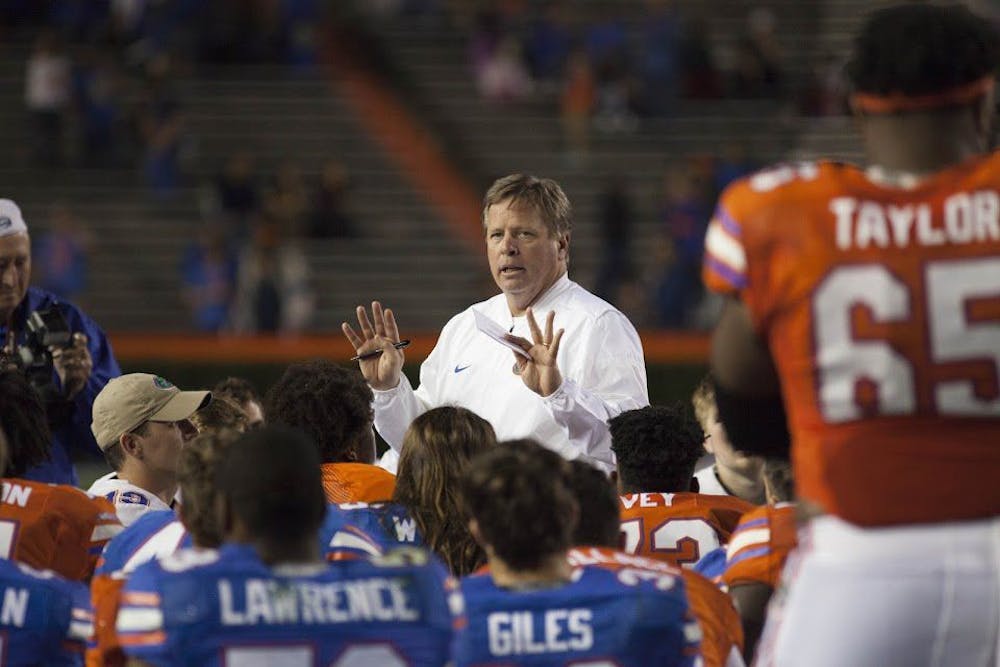Before you start commenting that I’m an entitled millennial sh-t for defending participation trophies, please know I recognize your concern. It’s definitely a cliché thing for a 20-year-old to do. But with the number of slam pieces written about the privileged “snowflake” generation and its sense of entitlement, I think there’s something to be said about how participation trophies can actually be a good thing.
I got thinking about participation trophies about two weeks ago when UF football coach Jim McElwain brought them up at his weekly press conference.
“There’s a lot of kids now with all this participation ribbon stuff that they get for just showing up,” he said, “that I’m not sure they’re really learning the lessons in life as far as picking yourself up off the ground all the time.”
It’s that second part that I’m interested in. The part about kids not learning to pick themselves up and try harder when they don’t win. Is that really all kids learn from participation trophies? Because it certainly wasn’t that way in my experience.
As a kid, I played baseball. At the end of every season, I’d attend an awards ceremony where everyone from all teams received — you guessed it — participation trophies. They were exactly the same for every player from every team.
However, there were also four special awards: Most Improved, Best Offensive Player, Best Defensive Player and the coveted MVP award.
Because those secondary awards existed, they basically nullified the value of participation trophies. They made them nothing more than a nice little keepsake or memento of a fun season playing baseball.
I think that’s great, because I certainly don’t remember what teams I played for as a little leaguer at this point, let alone 20 years from now. Because there was motivation in the form of larger awards, those participation trophies served as keepsakes for me but didn’t give me any sense of entitlement when I was a kid.
The same thing happened when I played football later on, although in a slightly different form. Everyone who played got a trophy, but the team that won the championship got bigger trophies.
It’s a different emphasis than what I talked about with baseball — teamwork over individual performance — but the same principle still holds: There’s motivation to do more. Even though you got a trophy, there’s still not a sense of entitlement because you know you could’ve done better.
But maybe these aren’t the scenarios you envisioned when I first brought up participation trophies. You might have imagined something more like what happened at a friend of mine’s high school graduation.
She and many others wore multiple sashes, cords and ribbons to the ceremony for being leaders of various clubs or achieving certain grades. However, every single person also got a “Panther medal” to wear just because they were graduating. They meant nothing.
This, I’ll admit, is problematic.
It reminds me of Dash's line in “The Incredibles” after his mom told him everyone is special: “Which is another way of saying no one is," he answered.
A similar example comes from the Adult Swim cartoon "Rick and Morty." In the first episode of the show’s third season, Jerry, a naive moron of a father figure, gets a new job where he’s showered in awards. He can’t figure out why he’s getting them, but he’s very happy about it.
It’s not the same as the graduation medal example, because it’s not like a bunch of people are just getting the same award, thus rendering them meaningless. It is similar, though, because it creates a false sense of achievement when awards are given out for no reason at all.
But what if he were hypothetically being rewarded just for effort?
I can practically hear the smoke flowing from your ears as you scream that effort is nothing to be rewarded. That only results matter.
To that, I say: Really?
I know results are important, but is the message you want to send kids really that winning is the only thing that matters?
It’s great to reward achievement for sure. Nothing wrong with that. But recognition for effort doesn’t seem controversial either.
Why not reinforce the value of trying rather than only the importance of winning?
Ethan Bauer is the sports editor. His columns appear on Wednesdays. Contact him at ebauer@alligator.org, and follow him on Twitter @ebaueri.
UF head coach Jim McElwain talks to his players after Florida's spring game on April 7, 2017, at Ben Hill Griffin Stadium.






